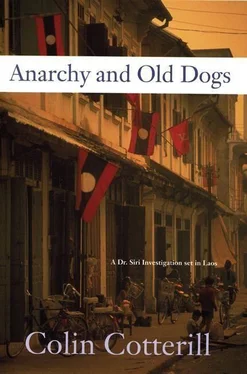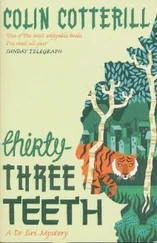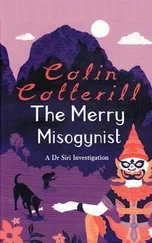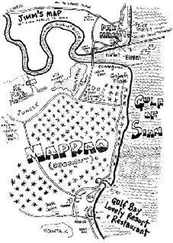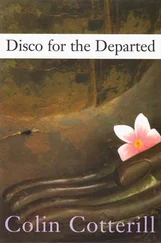Colin Cotterill - Anarchy and the Old Dogs
Здесь есть возможность читать онлайн «Colin Cotterill - Anarchy and the Old Dogs» весь текст электронной книги совершенно бесплатно (целиком полную версию без сокращений). В некоторых случаях можно слушать аудио, скачать через торрент в формате fb2 и присутствует краткое содержание. Жанр: Криминальный детектив, на английском языке. Описание произведения, (предисловие) а так же отзывы посетителей доступны на портале библиотеки ЛибКат.
- Название:Anarchy and the Old Dogs
- Автор:
- Жанр:
- Год:неизвестен
- ISBN:нет данных
- Рейтинг книги:3 / 5. Голосов: 1
-
Избранное:Добавить в избранное
- Отзывы:
-
Ваша оценка:
- 60
- 1
- 2
- 3
- 4
- 5
Anarchy and the Old Dogs: краткое содержание, описание и аннотация
Предлагаем к чтению аннотацию, описание, краткое содержание или предисловие (зависит от того, что написал сам автор книги «Anarchy and the Old Dogs»). Если вы не нашли необходимую информацию о книге — напишите в комментариях, мы постараемся отыскать её.
Anarchy and the Old Dogs — читать онлайн бесплатно полную книгу (весь текст) целиком
Ниже представлен текст книги, разбитый по страницам. Система сохранения места последней прочитанной страницы, позволяет с удобством читать онлайн бесплатно книгу «Anarchy and the Old Dogs», без необходимости каждый раз заново искать на чём Вы остановились. Поставьте закладку, и сможете в любой момент перейти на страницу, на которой закончили чтение.
Интервал:
Закладка:
This was how Siri would have gone about proving the identity of Deputy Say’s assassin. While the governor’s driver was out hunting for magnesium, Siri and a reluctant Officer Tao removed Say’s body from the bath and took an impression of the right index finger using a square of carbon paper. All they needed then was to compare it to that on the handle of the heater to determine whether Say had committed suicide and, if not, to start the murder inquiry. Then would begin the arduous business of fingerprinting anyone who had access to the deputy’s house on the night in question. But the god of unnecessary paperwork intervened. Even before they had the powder, the crime solved itself.
Officer Tao had gone to the home of the mother of the deputy governor’s wife in order to obtain the addresses of her staff and close friends. She was an uncomplicated woman. Like many of the nouveau powerful in Laos, Say had gone into the villages and found himself a pretty but uneducated wife to complement his new lifestyle. Tao told her of the magic of fingerprinting and how they would be able to determine the identity of the murderer even without torturing the suspects. To his amazement, the woman burst into tears right in front of him and dropped to her knees.
“It was me. It was me,” she sobbed. “I didn’t realize. ‘Bring me some more hot water,’ he shouted. And there he was, all round and ruddy from all them Soviet pleasures: the vodka and the food and the big-boned women I wouldn’t wonder. ‘Bring me some more hot water.’ What on earth did he want a hot bath for? It’s humid enough to bathe standing up with all your clothes on this time of year. He was just showing off that he’d been given a water heater. That was all. So, I thought, what’s the point of having it if you still have to lug heavy pails back and forth across the kitchen? I took the heater out of the bucket, hooked it on the side of the bathtub, and dropped it into the water.”
She sobbed then for a full minute, unable to speak. Tao stood over her with a rather embarrassed look on his face.
“I didn’t know it’d kill him,” she went on. “Just thought it might singe him a little bit and teach him a lesson. But he sort of sizzled and shook and this big grin spread over his face like he was enjoying it. I didn’t know what to do. I jumped back and watched him fry. Next thing I knew he was dead.”
It was 11:45 a.m. when Tao related the story to Siri and the governor. Say’s wife was locked up in the Pakse police station and the case was solved. The Soviet Union was exonerated, the governor placated, and the widow allowed to purge her demons of guilt all with fifteen minutes to spare before lunch. It was Siri’s fastest ever conclusion of a case but he was still a little upset that he hadn’t been given the opportunity to eliminate the suspects one by one through the magic of dactyloscopy.
Free Lao
Siri told all this to Civilai under the tarpaulin of a rather special noodle stall overlooking the Mekhong ferry ramp. The lady owner, Daeng, began her day at four in the morning just to have everything perfect by lunchtime. But apart from being a noodle perfectionist she had many other arrows in her quiver.
At the hotel, when they’d returned from the cinema the previous night, Siri had casually mentioned Madame Daeng, the cook to the night clerk. Siri held out little hope that his old friend would still be there after all these years. That’s why he’d been so surprised by the reaction. The clerk had laughed and told him more people in Pakse knew the name Madame Daeng, the cook than they did President Soupanouvong. He’d told Siri where she could be found and, sure enough, here she was.
She still had the keen, all-seeing eyes and the fine delicate features that had fascinated so many young men back when. The look of shock on her face could have drained the river for ten miles in each direction. She’d tossed the noodle sieve into the boiling water, hobbled over to her famous doctor on legs stiff with rheumatism, and thrown her arms around him. Ignoring the stares of the mystified diners, Siri and Daeng could feel the strong beating of each other’s hearts as they stood locked together like hands clasped in prayer. From his stool beside the noodle cart, Civilai had timed the embrace at a minute, but for the old comrades it was an exchange of missed decades, of battles and loves and losses, of friends departed and disasters shared.
Siri had first met Daeng thirty-seven years earlier at the southern youth camp where he and his wife, Boua, were serving with the Free Lao movement. Daeng had been their cook. At first that was all the remarkable young woman had done, but she soon demonstrated skills and determination far beyond the wok. In 1940, the French had urged the Lao to set up the youth movement in answer to Thailand’s posturing about shifting its eastern border into Lao territory. It was intended as a mechanism to engender nationalistic feeling against the Thais. When Siri and Boua returned from their studies in France at the end of ‘39, the camp in Champasak had been their first posting. They’d spent two years training young medical interns, teaching French, and molding young minds. What the French didn’t realize was that the youth camps they were sponsoring around the country had a well-hidden and brilliantly conceived agenda. In them the foundations were being laid for ousting the French oppressors. It was from the youth initiative that the Lao Issara-the Free Lao movement-was born, and Siri and Boua had been instrumental in its creation in the south.
When the youth camps were finally closed down by the French for becoming too radical, the Free Lao began its subversive acts of rebellion. Madame Daeng, then a miss, had tagged along with the rebels, cooking, tossing the odd grenade, joining in the campfire plots. She was an inspiration to the young Lao who had grown strong from her noodles, and she was a valuable ally to Siri and Boua. But in the confusion that accompanies a guerrilla war, they’d lost touch. Siri and Boua had gone to Vietnam and Daeng remained in the south. And now, on Siri’s first day back in Champasak, they had been reunited.
Siri introduced her to his cousin, “Pop,” and she looked at Siri with a wry smile on her sun-rusted face. She’d always been able to tell when he was lying. She greeted the “cousin” and told Siri their reunion proper could wait. For the time being, she promised them the best lunch they’d ever tasted in their lives and went to fish the sunken sieve from its tank. Siri knew from experience that this wasn’t an idle promise. When the huge bowls arrived in front of them, the aroma was poetry enough to make them lose the threads of their morning adventures. The piquant spices caressed their palates and reminded them how many years it had been since they’d really tasted food. Even Siri in his nullified state could pick out every herb, root, and legume. He forgot Civilai, just as Civilai had no further interest in him, until the last spoonfuls of broth had made the trip north.
It was Civilai who spoke first. “That… that was…”
“I know.”
“Let’s take her back to Vientiane,” Civilai said, only partly in jest.
“She could have a real restaurant there, not sweat out her days for ferry passengers under a grimy tarpaulin for fifty kip a plate. She should be rolling in money.”
“Believe me, brother,” Siri said, “Madame Daeng is the type of woman who could roll in whatever she pleases. If this is what she’s chosen it’s because it makes her happy.”
“Even so…”
“All right. You’ve heard enough of men in baths and silly wives. It’s your turn. Tell me about the post office.”
“I wish I had a long funny story with a happy ending.”
Читать дальшеИнтервал:
Закладка:
Похожие книги на «Anarchy and the Old Dogs»
Представляем Вашему вниманию похожие книги на «Anarchy and the Old Dogs» списком для выбора. Мы отобрали схожую по названию и смыслу литературу в надежде предоставить читателям больше вариантов отыскать новые, интересные, ещё непрочитанные произведения.
Обсуждение, отзывы о книге «Anarchy and the Old Dogs» и просто собственные мнения читателей. Оставьте ваши комментарии, напишите, что Вы думаете о произведении, его смысле или главных героях. Укажите что конкретно понравилось, а что нет, и почему Вы так считаете.
